Rwanda bill begins tricky Lords stagepublished at 18:13 GMT 4 March 2024
Peers have defeated the government already, as they debate changes to the proposed bill.
Read MorePeers have defeated the government already, as they debate changes to the proposed bill.
Read MoreWe'll be back on Wednesday
That's all from the BBC Africa Live team for now.
Until we're back, there'll be an automated service here, plus you can get the latest news on our website or listen to our podcasts - Africa Daily and Focus on Africa.
Our African proverb of the day:
Quote MessageYou should not hide something under your armpit while you are pounding something else in a mortar."
A Kono proverb sent by Jimissa in Freetown, Sierra Leone
Click here to send us your African proverbs.
And we leave you with this shot of Kenyan healthcare workers protesting in the capital Nairobi.
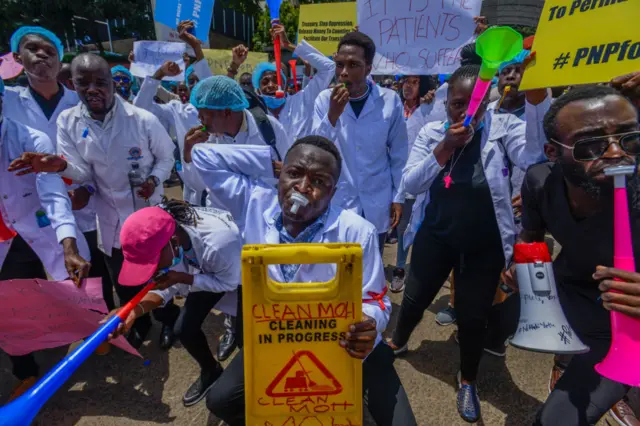 Image source, Getty Images
Image source, Getty ImagesKenyan healthcare workers protesting
 Image source, Getty Images
Image source, Getty ImagesPresident Mnangagwa has been in power since 2017
The United States government has imposed sanctions on Zimbabwe's President Emmerson Mnangagwa, along with other senior officials, for corruption and human rights abuses.
On Monday the US government said leaders in Zimbabwe were siphoning off public resources for personal gain.
This move scraps the old executive sanction order introduced in 2003 and moves 11 individuals and three entities onto the global list - the Global Magnitsky sanctions program.
"These illicit activities support and contribute to a global criminal network of bribery, smuggling, and money laundering that impoverish communities in Zimbabwe, southern Africa, and other parts of the world," a statement said.
The US also criticised the targeting of civil society and severe restrictions on political activity.
As well as President Mnangagwa, Vice-President Constantino Chiwenga and businessman Kudakwashe Tagwirei have also been sanctioned.
Mr Mnangaga's wife, Auxillia Mnangagwa, was also hit with sanctions because she "facilitates her husband’s corrupt activities".
The US government said the egregious behaviour of some of the most powerful people and companies in Zimbabwe matched the actions of the worst human rights abusers and corrupt actors in the world.
The US assured that "sanctions on theses individuals and entities do not represent sanctions on Zimbabwe or its public".
The government of Zimbabwe has not commented on the latest allegations but has dismissed previous sanctions as part of a Western plot to bring about political change.
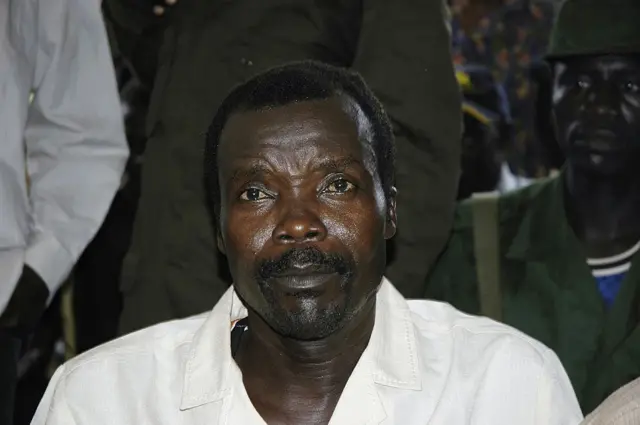 Image source, Getty Images
Image source, Getty ImagesJoseph Kony is accused of multiple crimes against humanity
Judges at the International Crime Court (ICC) have ruled that prosecutors can bring a hearing on charges against a fugitive Ugandan warlord despite his absence.
Joseph Kony was the leader of the notorious Lord’s Resistance Army (LRA), which abducted thousands of children to use as soldiers or sex slaves.
The hearing has been scheduled for 15 October.
He is accused of 33 counts of war crimes and crimes against humanity.
Joseph Kony formed the LRA in Uganda over two decades ago and claimed to be fighting to install a government based on the Bible's Ten Commandments.
The arrest warrant for Mr Kony was issued in 2005, but he has evaded capture.
At one time he was pursued by Ugandan and US troops but they gave up the chase in 2017, arguing that with his dwindling band of followers he had become a spent force.
He is also accused of brutalising civilians in northern Uganda through murder, abduction, mutilation and the burning of property.
Last week, the ICC awarded reparations of €52m ($56m; £44.5m) to victims of LRA commander Dominic Ongwen.
Read more:
The delayed 2023 African Games in Accra will be a "golden opportunity" for host country Ghana, according to local organisers.
Read MoreThe House of Lords debates and votes on the government's attempts to send some asylum seekers to Rwanda.
Read MoreThe young girl went missing from her home in an informal settlement near Cape Town two weeks ago.
Read More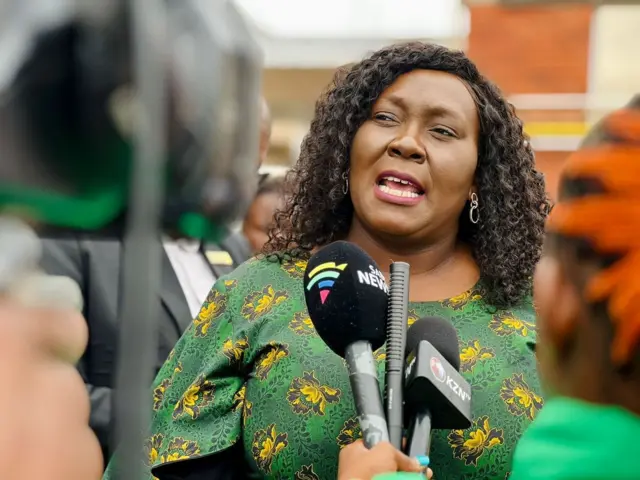 Image source, KwaZulu-Natal Department of Health/Facebook
Image source, KwaZulu-Natal Department of Health/FacebookKwaZulu-Natal provincial government's official in charge of health, Nomagugu Simelane
South African health officials in the KwaZulu-Natal province have issued an alert over the outbreak of pinkeye disease and called on people who suspect they have the infection to seek treatment.
At least 161 cases of the infection have been confirmed in various parts of eThekwini district in the province since last week, according to provincial official in charge of health, Nomagugu Simelane.
Ms Simelane has urged the public to practice good personal hygiene to avoid getting the eye infection and stop its spread.
Pinkeye is an infection that causes inflammation of the tissues lining the eyelid and the eyeball, also known as conjunctiva.
It is most often caused by a viral infection, also known as viral conjunctivitis, which is highly contagious.
It can also can be caused by a bacterial infection or an allergic reaction.
Its symptoms include pink or red colour in the white of the eyes, swelling of the conjunctiva and increased tear production.
 Thomas Naadi
Thomas Naadi
BBC News, Accra
 Image source, Getty Imagesa
Image source, Getty ImagesaGhana's LGBTQ+ bill has been condemned across the world, especially in the West
Ghana's ministry of finance has advised against the controversial anti-LGBTQ+ bill, saying it could see the West African country lose almost $3.8bn (£2.9bn) in World Bank funding over the next five years.
The draconian bill, which prescribes a three-year jail term for people who identify as LGBT+ and five years for promoting their activities, was passed by parliament last week.
The ministry of finance has recommended that President Nana Akufo-Addo does not sign the bill into law until the country’s Supreme Court rules on whether it aligns with Ghana’s constitution or not.
In a statement issued on Monday, the finance ministry said Ghana could lose about $850m in support this year alone.
Officials say this would negatively impact an already struggling economy, reduce the country’s foreign reserves, and affect exchange rate stability.
Ghana is under a three-year IMF bailout support programme, and there are concerns that any shortfall in funding from the World Bank and other donors could derail the economic recovery.
The bill has been widely condemned by the UK and the US, while rights groups have described it as regressive.
Ghana’s president has seven days after receiving the bill to decide whether to assent to it or not and 14 days to give reasons for his decision.
Mr Akufo-Addo is reported to be holding meetings with key ministries and development partners to assessment the potential impact of the bill.
Human rights groups in Ghana have vowed to challenge the anti-LGBT legislation in court.
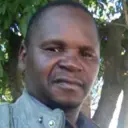 Jose Tembe
Jose Tembe
BBC News, Maputo
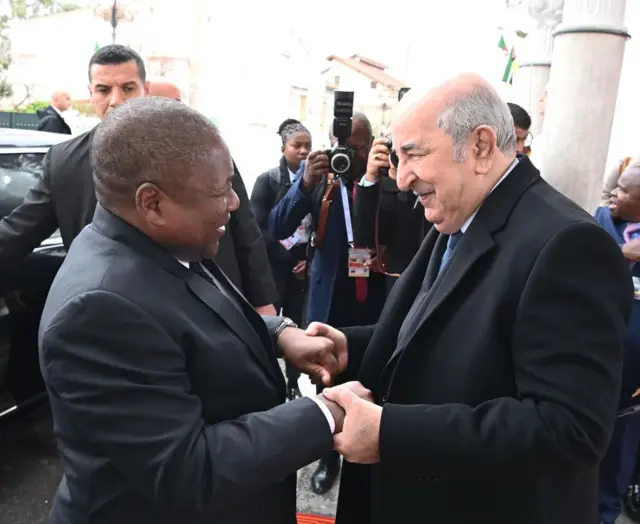 Image source, Getty Images
Image source, Getty ImagesMozambique President Filipe Nyusi (L) met Algerian President Abdelmadjid Tebboune (R) in Algiers last week
The Algerian government has pledged to support Mozambique in the fight against kidnapping and the jihadist insurgency primarily affecting the northern province of Cabo Delgado.
The agreement comes after Mozambique President Filipe Nyusi's four-day visit to Algeria.
President Nyusi told journalists on Sunday that Algeria had "promised immediate support for the Local Force, the one that is fighting terrorism".
He added that the North African country would train their forces and send equipment to help them in their fight against jihadist groups.
The two countries have deep historical ties, as the first guerrillas for Mozambique’s liberation war were trained in Algeria.
The Algerian pledge comes at a time when reports from Cabo Delgado say jihadists passed through Quissanga on Friday night, stole food and created panic.
The gas and ruby-rich province of Cabo Delgado has been a magnet for Islamist groups seeking to exploit its natural resources. Numerous multinational companies operate in the area.
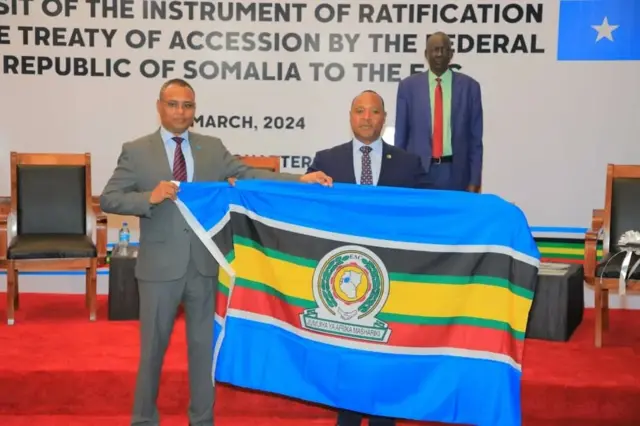 Image source, East African Community/X
Image source, East African Community/XSomalia is the eighth member of the EAC bloc
Somalia has become a full member of the East African Community (EAC) after completing all the steps required to gain complete membership of the regional bloc.
The EAC secretariat on Monday shared on X, external, formerly Twitter, that Somalia had gained full membership "after depositing her Instrument of Ratification with the Secretary General" of the bloc.
The instrument of ratification is a formal document issued by a country, in which it agrees to be bound by a treaty.
Last November, the heads of state of the other EAC member states agreed to admit Somalia into the bloc.
Somalia becomes the eighth member of the EAC after Burundi, the Democratic Republic of Congo, Kenya, South Sudan, Tanzania, Rwanda and Uganda.
The move is intended to boost economic growth in the country, which is still recovering from three decades of war.
More BBC stories from Somalia:
 BBC Monitoring
BBC Monitoring
The world through its media
 Image source, AFP
Image source, AFPCrépin Mboli-Goumba is a fierce government critic
The authorities in the Central African Republic (CAR) have detained a prominent government critic as he attempted to travel outside the country.
Crépin Mboli-Goumba - the leader of the Republican Bloc for the Defence of the Constitution (BRDC) - was arrested alongside his wife on Sunday at the main airport in the capital, Bangui.
Local media say Mr Mboli-Goumba and his wife were headed to Douala, Cameroon, for medical reasons.
Mr Mboli-Goumba's wife was released, but the politician remains in custody.
The reason for his arrest is unknown, but private Oubangui Medias website reported that he had been targeted by the judiciary after he spoke of a “legal mafia” in regards to a property dispute between him and the family of former president Andre Kolingba.
Mr Mboli-Goumba accused Minister of State Arnaud Djoubaye Abazene of interfering in the dispute.
Mr Mboli-Goumba is a fierce critic of the government of President Faustin Archange Touadera and has repeatedly criticised the presence of Russian mercenary firm Wagner Group in the country.
 BBC Monitoring
BBC Monitoring
The world through its media
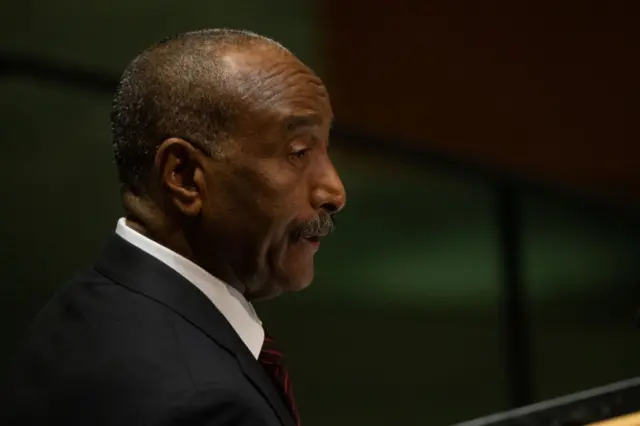 Image source, Getty Images
Image source, Getty ImagesGen Burhan met members of a recently formed AU panel to facilitate Sudan dialogue
Sudan's military leader Abdel Fattah al-Burhan says Sudan will only consider the African Union’s proposal to end the conflict if the continental bloc reinstates its full membership.
The AU suspended Sudan following the military takeover of power on 25 October 2021.
Gen Burhan met members of the recently formed AU High-Level Panel on the Resolution of the Conflict in Sudan, led by Mohamed Ibn Chambas, on Sunday.
The three-member panel was established by the AU Commission in January to facilitate dialogue, restore constitutional order and work collaboratively with Sudanese stakeholders and the international community towards lasting peace.
A statement on the ruling Sudanese Sovereign Council’s Facebook page said, external Gen Burhan expressed “Sudan’s confidence in the AU and the potential solutions it can provide to end the war, but only if the state regains its full membership and the organisation treats it as such”.
The statement added that Ibn Chambas reiterated the AU’s commitment to helping end the conflict and restoring stability in Sudan.
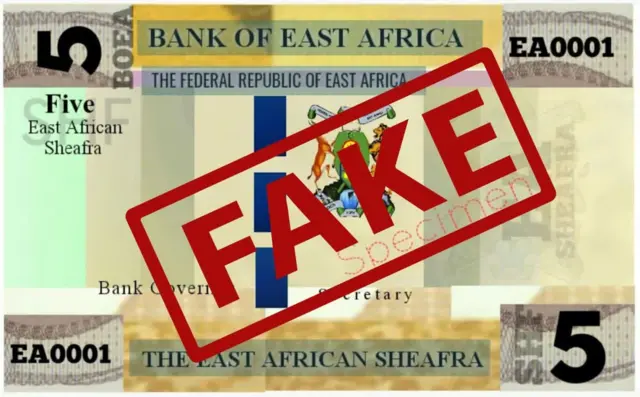 Image source, EAC Secretariat/X
Image source, EAC Secretariat/XThe EAC secretariat says the announced banknote is fake
The secretariat of the East African Community (EAC) regional bloc has dismissed a post on X, formerly Twitter, which claimed that the bloc's member countries have launched a common regional currency.
The post had been shared on Sunday by a fake X account named "Government of East Africa", external.
The account said that the currency was called the East African Sheafra, a combination of the shilling of East Africa and Franc.
The account also shared an image of a fake banknote of the purported single currency.
The post has received over half a million views and was shared by some leading media outlets and online personalities in the region.
The EAC secretariat dismissed the report, external of a unified regional currency late on Sunday, saying that the creation of a single East African currency "is still a work in progress".
"Kindly ignore any rumours circulating in social media on the unveiling of new banknotes for the region."
In 2013, EAC member countries set a target for a single currency by 2024.
The bloc missed the target and pushed the delivery time for the single regional currency to 2031.
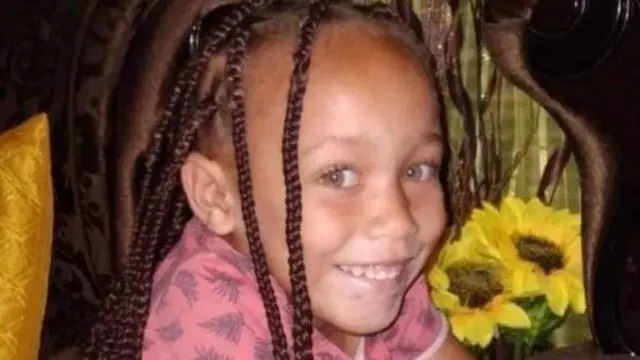 Image source, Executive Mayor Andrè Truter/ Facebook
Image source, Executive Mayor Andrè Truter/ FacebookSix-year-old Joslin Smith went missing on 19 February
South African authorities have intensified the search for a missing six-year-old girl, with a unit of the navy joining the operation.
Pieces of clothing allegedly stained with blood were found in Saldanha Bay near Cape Town over the weekend.
Joslin Smith disappeared from outside her home in an informal settlement in Saldanha on 19 February.
On Sunday, the South African Police Service said that an identified area in Diazville in the locality had been subdivided into zones to co-ordinate the search.
It said that a mounted police unit and more specialised dogs had been brought in to scour the identified area.
The items found over the weekend have been sent to a forensic laboratory for analysis.
The police have appealed to the public “to refrain from spreading false information on social media and recording the searches" as this may affect the investigation.
“The primary focus of the coordinated efforts should be to find Joslin or what happened to her,” it said.
 Image source, Kafui Dey/Instagram
Image source, Kafui Dey/InstagramChef Failatu Abdul-Razak violated the rest break rules, her team said, citing Guinness World Records
Guinness World Records (GWR) has dismissed a Ghanaian chef's attempt to break the world record for the longest cooking marathon by an individual, her team says.
In January, Failatu Abdul-Razak appeared to have broken the world record after cooking non-stop for more than 227 hours.
The co-ordinator of Ms Abdul-Razak's challenge, Kafui Dey, on Sunday said that her attempt at breaking the record "unfortunately fell short of meeting the stringent guidelines set forth by Guinness World Records".
"A statement from the Records Management Team cited a violation of the rest break rules, resulting in an unsuccessful attempt."
A GWR spokesperson told the BBC despite the fail they "commend Failatu on her tremendous efforts with this record attempt".
Adding that it was "due to guidelines around rest break timings not being met".
Ms Abdul-Razak's attempt caused widespread excitement across Ghana.
Politicians, including Vice-President Mahamudu Bawumia, numerous celebrities and even the Ghanaian military expressed their support for Ms Abdul-Razak throughout the cook-a-thon.
Despite her failed bid, the chef thanked her supporters, saying that their "backing has been instrumental throughout this journey".
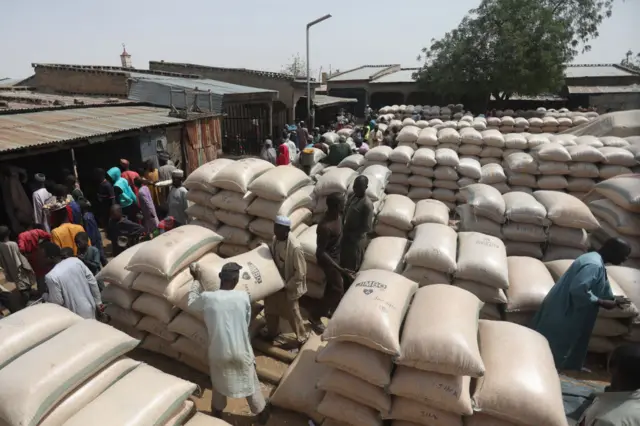 Image source, AFP
Image source, AFPThere have been increased cases of attacks on warehouses storing food
Nigerian authorities have heightened security at government food stores around the country amid a crisis.
With people struggling to afford food, recently there have been increased cases of attacks on warehouses to steal food items.
On Sunday, the National Emergency Management Agency (Nema) said on X, formerly known as Twitter, external, it was increasing security “to forestall any breaches” at its offices and warehouses nationwide.
It comes after local residents looted food items including bags of maize at a facility in Nigeria’s federal capital, Abuja. The looters also vandalised the warehouse.
The incident, which reportedly went on for hours, is said to have caused a gridlock as people blocked roads near the area.
Some videos are being shared online showing the chaotic scenes on Sunday, with crowds gathered around the facilities and others walking away with sacks of grain.
Police told local media that the situation had been brought under control.
The incident came amid an economic crisis in the country which has seen the prices of goods and services rise significantly, with inflation rising to nearly 30%.
More on Nigeria's cost of living crisis:
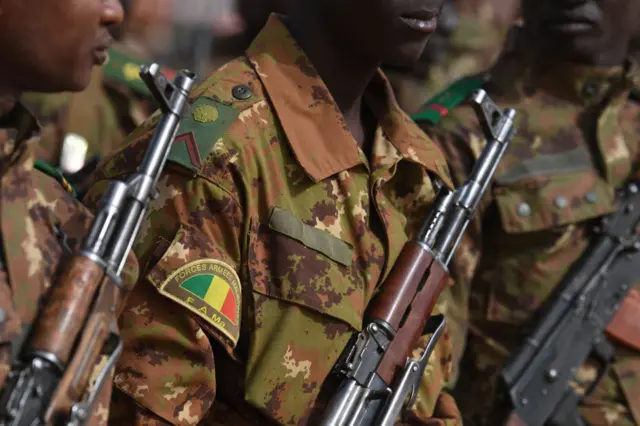 Image source, AFP
Image source, AFPInternational human rights groups have previously accused Mali's army of abusing and killing civilians in its fight against insurgents
A colonel in Mali's army has been arrested over his recently released book, which contained accusations that the army has committed human rights abuses against civilians.
In the 400-page book titled Mali: The Challenge of Terrorism in Africa, Col Alpha Yaya Sangaré, citing human rights groups, wrote: "Since 2016, the FDS [Defence and Security Forces] have engaged in abuses against people accused to be part of terrorist groups".
He added that army personnel committed the abuses "with the complicity of the military hierarchy".
Mr Sangare was arrested late on Saturday, but the arrest was confirmed by his family on Sunday.
Mali's defence ministry had last Friday denounced the accusations published in the book and called them "false".
Several international rights groups have accused Malian troops of abusing and executing civilians in their fight against Islamist insurgents.
Yasine Mohabuth
Port Louis, Mauritius
 Image source, AFP
Image source, AFPThe pilgrims were walking to Grand Bassin lake when some effigies caught fire
Six people died in Mauritius in a fire that broke out during a Hindu pilgrimage.
Seven others were injured in the incident on Sunday, and were admitted to hospital for medical attention.
Police say a wooden and bamboo cart carrying effigies of deities caught fire after coming into contact with electric wires.
The pilgrims were walking to Grand Bassin lake, considered sacred by the island's Hindu community, ahead of a religious festival on 8 March.
Those who died were aged between 18 to 20 years.
A 16-year-old teenager is among the injured, with a reported serious condition.
Prime Minister Pravind Jugnauth, in a statement on national TV, conveyed his deep shock and condolences in the wake of the tragic incident.
This is not the first such occurrence; a similar tragedy unfolded last year in Mare-Longue, resulting in the loss of two lives.
The authorities are now urging all pilgrims to strictly adhere to safety instructions, particularly concerning the dimensions of the kanwars (a structure carried by pilgrims).
Our African proverb of the day:
Quote MessageYou should not hide something under your armpit while you are pounding something else in a mortar."
A Kono proverb sent by Jimissa in Freetown, Sierra Leone